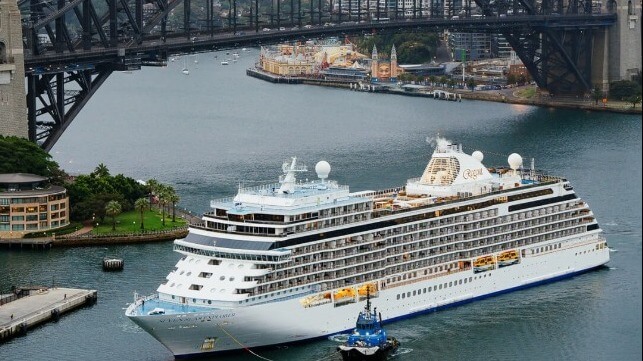Fourth Cruise Hit with Biofouling as New Zealand and Industry Meet

Cruise industry executives met with the New Zealand authorities after two more cruise ships have been denied entry to ports in what the media is now dubbing “dirty hull syndrome.” The issue of biofouling emerged in December just as New Zealand and Australia move into their summer high season in the first year international cruise ships have been permitted to return since 2020 and the onset of the pandemic.
Over the weekend, Cunard Line’s cruise ship Queen Elizabeth became the fourth cruise ship told by Biosecurity New Zealand that it would need to clean its hull of potential biohazards before it would be permitted into some of the country’s most sensitive areas. The cruise ships are being denied entry to Milford Sound, Fiordland National Park, and the ports along the South Island if they are judged not to meet New Zealand’s biofouling standards. The ships, including the Viking Orion at New Year, last week Recent Seven Seas Cruises luxury cruise ship Seven Seas Explorer, and now the Queen Elizabeth were given restricted access on a temporary basis to commercial ports while being instructed to arrange for hull cleaning by approved vendors before returning to New Zealand.
Biosecurity New Zealand environmental health manager Paul Hallett pointed out that the country has not changed its requirements but is increasing enforcement to reduce the entry of pests into their waters. The government agency reports that 90 percent of marine pests enter on the hull of ships. They said over the past two years only six percent of ships arriving in New Zealand were issued a notice directing them to address biofouling.
"The current biofouling standards were introduced in 2018, and Biosecurity New Zealand undertakes significant stakeholder engagement to help vessel operators comply with biofouling requirements," said Hallett. "As a result, we have seen an increase in proactive management of vessel hulls by operators and in awareness of our biofouling rules.”
New Zealand is monitoring for high-risk organisms like mussels, oysters, foliose algae, hydroids, tunicates, sponges, crabs, and starfish attached to the hull of arriving vessels. The ships are required to submit reports to Biosecurity NZ. According to local media reports, the Queen Elizabeth is skipping two ports on the current cruise with the scenic cruising, which most of the nearly 2,000 passengers aboard considered the highlights of the trip. The cruise ship however will still dock in Wellington, Lyttelton, Tauranga, and the Bay of Islands, but will not pass through Fiordland or stop in Dunedin. Australia in June 2022 introduced similar new biofouling standards for ships.
A spokesperson for Cunard Line called the standard the strictest in the world while speaking to the New Zealand media. "Cruise operators along with the broader shipping industry are adapting to the standard, with a wide variety of commercial ships also requiring additional cleaning to meet the requirements in 2022/23."
Last week, the Seven Seas Explorer (55,250 gross tons) submitted pre-arrival documentation to New Zealand. According to Hallett, "It didn't meet our biofouling standards because of higher than allowed levels of algae, barnacles, tube worms, and potential oysters present." The cruise ship was reportedly deferring its arrival into New Zealand’s waters to complete the required hull cleaning. The cruise was skipping ports while heading to Adelaide, Australia because the cruise line said it was unable to find a vendor to do the work in New Zealand. Also in December, Viking’s Viking Orion remained at sea for eight days after being denied entry into ports both in New Zealand and Australia due to what the cruise line described as “a limited amount of marine growth.” Earlier in December, Princess Cruises’ Coral Princess was also denied entry into Milford Sound due to reports of snails on the hull.
"Nothing in particular has changed, with the exception that there were probably more inspections being carried out this season because of the gap since ships were here last," said Kevin O'Sullivan chief executive of the NZ Cruise Association representing the industry.
They called the meeting very constructive. Both Biosecurity NZ and the industry said they were working together to reduce the last-minute issues that caused the four cruises to miss ports and upset passengers.
